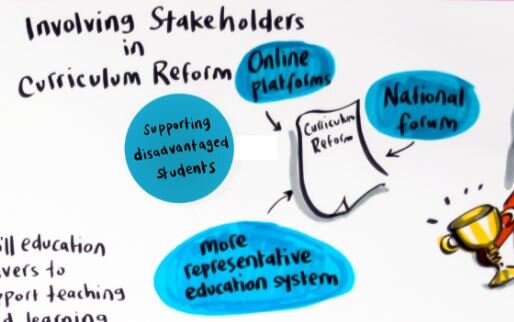Curriculum Reform Forum
A place for all stakeholders to have a voice in building the school curriculum.
Our current model of school curriculum design is to outsource to educational professionals. Whilst the experience of these experts is indisputably key to this task, this approach not only fails to engage the learners and teachers for whom the curriculum is designed, but in worst case scenarios serves to widen the socio-economic achievement gap. Those from disadvantaged backgrounds are the hardest hit. The digital divide is actually the social divide. The ovarian lottery dictates opportunity, access, resources, adults, social network and richness of educational provision.
Our discussion started around students who are disadvantaged in terms of access to educational resources and opportunities worldwide and how these students are identified, (in the UK, for example, whether it’s those on free school meals, those identified as vulnerable, or a wider group). But we also thought about what the social divide means in terms of skills, support, motivation to learn, diversity and relevance. The current approach to curriculum design simply doesn’t account for such differences.
21st century education demands more collaboration and end user input. Without this, it will be impossible to level the school playing field. So what about a place and process which brings key stakeholders together to co-create the curriculum?
How does it work?
The idea is for a national forum created to develop and maintain a curriculum based on stakeholder educational needs, which can flex over time (to meet developing/new needs and reflect advances in tech, science, ethics etc.), which has local and global themes, and which underpins portfolio-based assessment.
Value to end user
Rebecca Osborne drawing snippet
Brings all stakeholders to the table
Redefines attainment and closing the attainment gap
Validates real-life learning that takes place outside school
Gives agency to socio-economically disadvantaged students
Education design that’s real and relatable to students
Develops a lifelong love of learning
Provides universities and employers with a larger pool of applicants who can prove their skills
Builds resilient citizens/workforce – able to learn and adapt
How is it different/new?
More representative education system
Democratic way of defining education
Education that is closer to society, not outsourced to education professionals
Radically different learning experience
Blessed, not dictated, by policy
What is needed to make it real?
Exploration of what other methods have been tried and tested in other contexts
Methodology – e.g. how to engage stakeholders early and incorporate their ideas into ideation, how to manage different starting points, how to elicit, process and bring together expert and stakeholder views, consultation of multi-stakeholder groups to prompt exploration and analysis of needs etc.
Stakeholders, channels to stakeholders and platform(s)
Spaces for the voice of the child/student to be present (not represented) and consultation over time – so that voices are not lost, and to understand changes in perspective as stakeholders progress along their journey
Framework, and guidance on e.g. how schools, teachers, learners identify what is relevant at a specific time to specific learners
Everyday + policy language descriptors
A way of socialising the framework - making it available to stakeholders
Process for review and renewal
Full integration into education ecosystem
Technologies – mediation between ideas and implementation (conceptual, technical, digital)
Government support or grassroots community conversation building up to policy level
Have your say
Are you already working on something similar? Do you want to get involved with this?
Reckon we’ve got it all wrong but know the solution we’re looking for? We’d love to hear from you - drop us a comment below.

